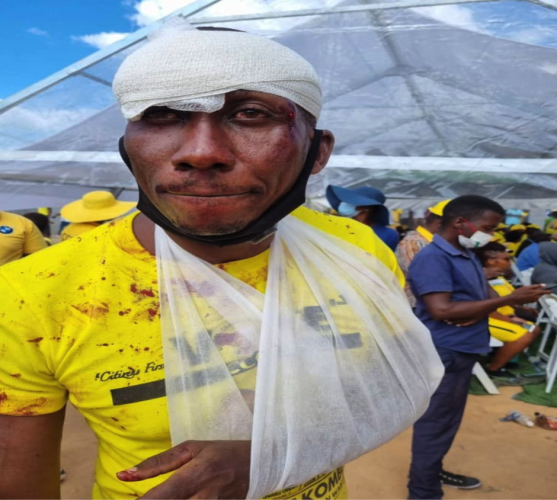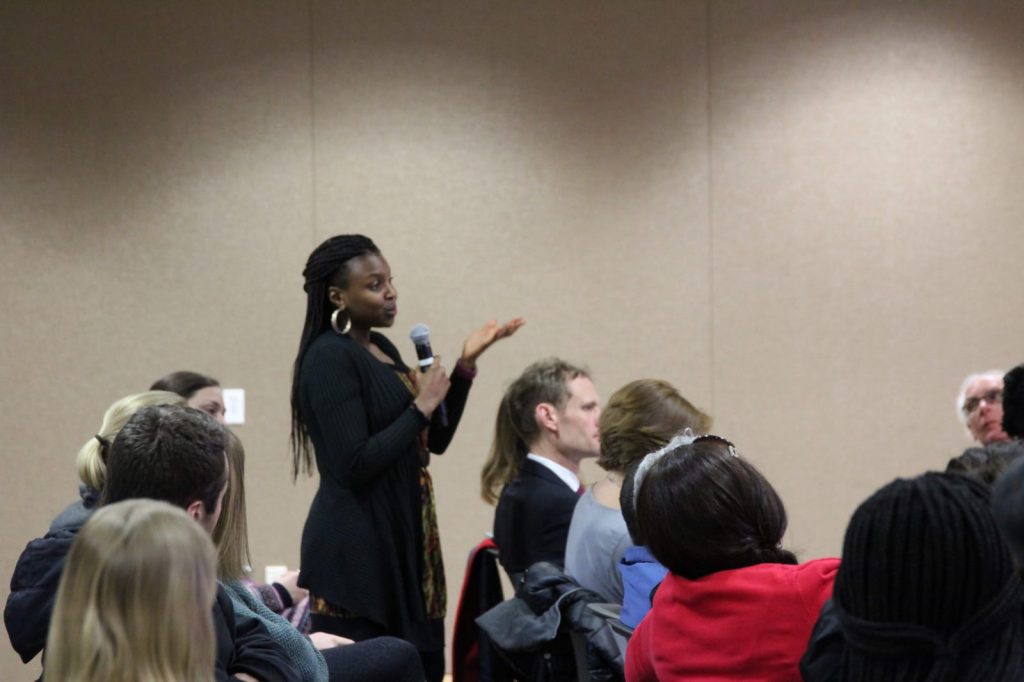“We Will Crush You Like Lice:” The Spectre of Political Violence in Zimbabwe

Dr. Charles Moyo, Research Analyst, Security & Intelligence Policy Lab
cmoyo@africacfsp.org
The nation of Zimbabwe had by-elections in March 2022 and will host general elections in 2023. In protest of this new electoral regime, political violence has reared its ugly head. Due to their violent tendencies against the political opposition, the cadres of the ruling party, ZANU PF, and the state security agents are associated with the following lexicon: ‘merchants of violence.’ This article illuminates the issues of political violence in Zimbabwe, especially concerning these elections. The article contends that political violence is inimical to free and fair elections, political legitimacy, social cohesion, and the country’s national image and development.
Introduction: Situating Zimbabwe’s Political Violence
In February of 2022, the political situation in Zimbabwe rapidly descended into the abyss of violence. Indeed, since February, Zimbabwe’s African National Union-Patriotic Front’s (ZANU PF) foot-soldiers and its state security agents have perpetrated violence against Zimbabwe’s primary opposition, the Citizens Coalition for Change (CCC). This new wave of violence reached its crescendo on 27 February. On this dreadful day, in Kwekwe, advocates of the ZANU PF attacked CCC’s supporters at a rally, killing one person and injuring 17 others.1eNCA. 2022. “One dead in new violence at Zimbabwe opposition rally.’’ eNCA, 27 February. Available: https://www.enca.com/news/one-dead-new-violence-zimbabwe-opposition-rally
In anticipation of elections (March 2022 and 2023), a politically violent thunderstorm has emerged from the dark atmosphere of resentment; however, it is not a foreign phenomenon in Zimbabwe’s body of politics. On the contrary, the enduring bloodshed is becoming a part of the country’s political culture – defining Zimbabwe across the pre-colonial, colonial, and post-colonial periods.2Charles Moyo. “Party Foot-Soldiers, Quasi-Militias, Vigilantes, and the Spectre of Violence in Zimbabwe’s Opposition Politics.’’ Modern Africa: Politics, History and Society, v8 (1), p. 65-103, ISSN 2570-7558. Available at: https://edu.uhk.cz/africa/index.php/ModAfr/article/view/241 The nation of Zimbabwe became underpinned by autocratic kingdoms in the pre-colonial era due to a reliance on force and violence. Between 1890 and 1980, the nation of Zimbabwe was shaped through colonialism in the region of Southern Rhodesia. This form of colonialism was devised through the force of violence and racism by minority rulership in Zimbabwe. Southern Rhodesia colonialism paralleled the border of Apartheid in South Africa. Unfortunately, this trajectory of political bloodshed has unrelentingly continued even after the country’s establishment of independence in 1980.
From 1982 to 1987, the Robert Mugabe regime implemented the genocidal ‘Gukurahundi’ policy. The policy was designed to decimate the opposition of the Patriotic Front of Zimbabwe African People’s Union (PF ZAPU) through the lexicon ‘stamp out the dissident activity.’ The endorsement of this dreadful policy claimed the lives of 20,000 civilians. These civilians resided in the Matabeleland and Midlands provinces.3Catholic Commission for Justice and Peace. 1997. “Report on the 1980s Disturbances in Matabeleland and Midlands.” Harare: CCJP. Available at: http://www. rhodesia.nl/Matabeleland%20Report.pdf Since the early 1980s, a group of perpetrators (army, intelligence, police, war veterans, and ZANU PF youths) has wreaked havoc in Zimbabwe through political violence, especially during election times. As a result, the elections in Zimbabwe have become a breeding ground for electoral bloodshed; the parties subjected to this electoral violence in Zimbabwe are the PF ZAPU, the Zimbabwe Unity Movement (ZUM), the Movement for Democratic Change (MDC), and the CCC.
Historically, if a new political opposition held office, the incumbent promoted massive violence in protest of the rival. The following is a list of these events: 1985 parliamentary, 1990 general, 1995 parliamentary, 2000 parliamentary, 2005 parliamentary, 2005 senatorial, 2008 general, 2013 general, and the 2018 general elections. However, the hope of democracy was resurrected when Mugabe was removed from power via a military coup in November of 2017, with Emmerson Mnangagwa being his successor. Yet, on 1 August 2018, a group of soldiers conducted a mass shooting, claiming the lives of six civilians.4Report of the Commission of Inquiry into the 1st of August 2018 Post- Election Violence. 2018. “Commission of Inquiry into the 1st of August 2018 Post-Election Violence.” Harare: Government Printers. Available at: https://t792ae. c2.acecdn.net/wp-content/uploads/2018/12/Final-Report-of-the-Commissionof-Inquiry-18-DEC-18-Distributed-via-Kukurigo.pdf (Accessed 1 September 2018) Furthermore, in January of 2018, state security agents killed 17 people, illustrating the magnitude of the Mnangagwa administration’s violence and intolerance. State-sponsored violence has resurfaced as the CCC intensified its political campaigns for the 26 March 2022 elections. It is highly likely the bloodshed will persist in the upcoming 2023 general elections.
The March 2022 By-Elections and 2023 General Elections
The nation of Zimbabwe relies on its timetable of elections, some of which transpired on 26 March 2022. The general elections will proceed in 2023, at a date to be proclaimed. There are 133 elections due for National Assembly; however, most of them are for local authority seats, falling to vacancy. This is due to the controversial recall of Members of Parliament with its counsellors by the opposition MDC-T party. Within this ruling party, the ZANU PF has maintained its violence and rhetoric, poisoning the political landscape of Zimbabwe. Unfortunately, the CCC and MDC-T are continuing in that dangerous tradition.
Inflammatory Language Increases the Likelihood of Violence
On 26 February 2022, Zimbabwe’s Vice President, Constantino Chiwenga, cited inflammatory language to the ruling ZANU PF, stating, “crush the opposition party [CCC] like lice.”5The Standard. 2022. “Chiwenga threatens to Crush CC.’’ The Standard, 27 February. Available: https://thestandard.newsday.co.zw/2022/02/27/chiwenga-threatens-to-crush-ccc/ His rhetoric was spawned at a rally in Kwekwe.6Ibid. The following day, ZANU PF members killed one person and injured 17 others in the same town. Notably, the UN Secretary-General, Antonio Guterres, contends that there exists a nexus between hate speech and physical violence.7United Nations. 2019. “Secretary-General’s remarks at the launch of the United Nations Strategy and Plan of Action on Hate Speech [as delivered],” United Nations. Available: https://www.un.org/sg/en/content/sg/statement/2019-06-18/secretary-generals-remarks-the-launch-of-the-united-nations-strategy-and-plan-of-action-hate-speech-delivered. Similarly, during the Gukurahundi genocide in Zimbabwe, inflammatory rhetoric espoused by ZANU PF leaders fueled the massacre of citizens by state security agents. For instance, on 5 March 1985, at a rally in Victoria Falls, Emmerson Mnangagwa likened PF ZAPU “dissidents” to bugs and cockroaches fit for extermination with DDT pesticide.8Mail & Guardian. 2017. “Gukurahundi ghost haunt Mnangagwa,’’ Mail & Guardian, 24 November. Available: https://mg.co.za/article/2017-11-24-00-gukurahundi-ghosts-haunt-mnangagwa/ Consequently, there were mass executions by state security agents, executions which left 20,000 civilians dead.9Catholic Commission for Justice and Peace. 1997. “Report on the 1980s Disturbances in Matabeleland and Midlands.” Harare: CCJP. Available at: http://www. rhodesia.nl/Matabeleland%20Report.pdf Mnangagwa’s inflammatory words were echoed eleven years later during Rwanda’s genocide. It is unsurprising that Chiwenga’s “lice” comment has triggered political mayhem in Zimbabwe.10The Standard. 2022. “Chiwenga threatens to Crush CC.’’ The Standard, 27 February. Available: https://thestandard.newsday.co.zw/2022/02/27/chiwenga-threatens-to-crush-ccc/
The Scourge of Political Violence: Recent Cases
There are several recent cases of politically motivated violence in Zimbabwe. On 17 February 2022, ZANU PF supporters attacked several CCC supporters with iron bars in the Harare East.11Nyashadzase Ndoro. 2022. “CCC supporters beaten up with iron bars by ZANU PF thugs in Harare,’’ Nehanda Radio. Available: https://nehandaradio.com/2022/02/17/ccc-supporters-beaten-up-with-iron-bars-by-zanu-pf-thugs-in-harare/ Two days later, police arrested and assaulted 13 CCC supporters in Harare.12Amnesty International. 2022. “Zimbabwe police attack on opposition supporter raises alarm.’’ Amnesty International. Available: https://www.amnesty.org/en/latest/news/2022/03/zimbabwe-police-attack-on-opposition-supporter-raises-alarm/ On 27 February 2022, ZANU PF cadres descended on a CCC rally – arming themselves with rocks, machetes, and iron bars – in an attack that claimed one person’s life (Mbonisi Ncube) and injured 17 others.13eNCA. 2022. “One dead in new violence at Zimbabwe opposition rally.’’ eNCA, 27 February. Available: https://www.enca.com/news/one-dead-new-violence-zimbabwe-opposition-rally On 11 March 2022, the car of the CCC National Spokesperson, Fadzayi Mahere, was destroyed by “unknown” assailants.14Pindula News. 2022. “Mahere attacked by unknown assailants in Harare,’’ Pindula News, 11 March. Available: https://zero.pindula.co.zw/fadzayi-mahere-attacked-by-uknown-assailants-in-harare/ Then, on 17 March 2022, a famous CCC supporter, Godfrey Karembera (Madzibaba VeShanduko), was severely battered by the police in Harare.15Nyashadzase Ndoro. 2022. “CCC supporters beaten up with iron bars by ZANU PF thugs in Harare,’’ Nehanda Radio. Available: https://nehandaradio.com/2022/02/17/ccc-supporters-beaten-up-with-iron-bars-by-zanu-pf-thugs-in-harare/
Implications of Political Violence in Zimbabwe
The implications of political violence are multi-pronged; therefore, it has ripple effects on the political and socio-economic fabric of any country, including Zimbabwe. A downside of the political bloodshed in Zimbabwe is that the upcoming polls are no longer unfree and unfair. The elections are becoming ‘flee and fear.’ Furthermore, Zimbabwean leaders are vastly distrusted because the deserving political office is often produced through violent actions. Zimbabwe’s President, Emmerson Mnangagwa, has experienced a legitimacy crisis since his ascendency to power via a military coup in 2017 to his post-2018 electoral violence. The administration’s continued political brutality likely will draw further attention to the illegitimacy of Mnangagwa’s governorship.
Political violence in Zimbabwe is also detrimental to national cohesion. The nation of Zimbabwe is already fractured along political, religious, and ethnic lines – radiating from past injustices such as colonial subjugation, the Gukurahundi genocide, and electoral violence. The existence of widespread political violence only adds to the fire, fueling the flames of bloodshed. Political violence in Zimbabwe will no doubt continue to dent the country’s national image. A negative national image scares away investors and tourists, a reality which impedes the country’s development and trajectory.
Conclusion and Recommendations
Political violence in Zimbabwe is hazardous to human security insofar as it infringes on free and fair elections. Political leaders from across the political divide should refrain from toxic and provocative rhetoric; instead, these chiefs should promote a harmonious co-existence and plurality of political thought and expression. They should further embrace the idea that political violence must be eliminated from Zimbabwean political and civil society.
Additionally, there should be harsher penalties for both the purveyors of genocidal language and the perpetrators of political violence. The issue of “catch and release” by the police when dealing with perpetrators of political violence should be circumvented. The political parties should also discipline their supporters by inculcating values of peace and tolerance. Security sector transformation (also known as security sector reform) would be critical in the professionalization of the country’s security forces to cease political violence and political interference.
Political violence is symptomatic of deep-seated social and structural issues, especially poverty and unemployment. This is exemplified by the fact that, according to police records, the violence on 27 February 2022 in Kwekwe was fashioned by the unemployed. Consequently, there is a need to address poverty and unemployment, issues which underpin violence in Zimbabwe. Addressing these issues will prevent the manipulation of youth by ‘merchants of violence.’
Most importantly, the Southern African Development Community (SADC) and Africa Union (AU) should closely monitor the political situation in Zimbabwe and intervene to prevent a descent into widespread political carnage that would cause extensive and undue loss of life.
Based on your interests, you may also wish to read:
- Intensified Insecurity & the Subversion of Security Sector Reform in South Sudan
- South Sudan & the Dilemma of Civilian Disarmament
- Principles for Independence: Maintaining African Autonomy in the Age of COVID-19
- The Southern African Development Community’s (SADC) Reaction to Security Threats in South Africa and Eswatini


